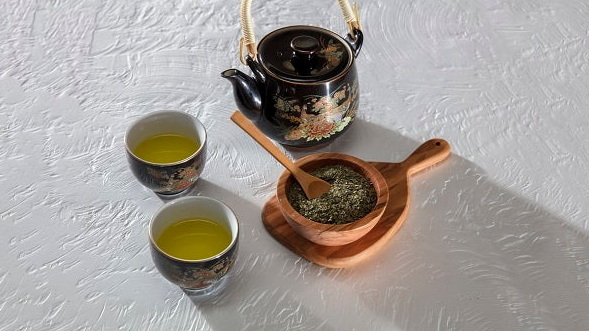Content Menu
● Introduction to Green Tea Extract
>> Composition of Green Tea Extract
● Health Benefits of Green Tea Extract
>> Cardiovascular Health
>> Cancer Prevention
>> Neuroprotective Effects
>> Metabolic Effects
● Cosmetic Applications
>> Oral Health
● Conclusion
● FAQs
>> 1. What are the primary active ingredients in green tea extract?
>> 2. How does green tea extract benefit cardiovascular health?
>> 3. Can green tea extract help prevent cancer?
>> 4. What are the cosmetic benefits of green tea extract?
>> 5. Is green tea extract safe to consume?
● Citations:
Green tea extract, derived from the leaves of Camellia sinensis, has gained significant attention for its potential health benefits, ranging from cardiovascular health to cancer prevention. The active ingredients in green tea extract are primarily catechins, with epigallocatechin gallate (EGCG) being the most abundant and studied component. This article will delve into the composition of green tea extract, its health benefits, and the role of EGCG in these benefits.

Introduction to Green Tea Extract
Green tea extract is a concentrated form of green tea, which is known for its high content of polyphenols. These polyphenols, particularly catechins, are responsible for the antioxidant properties of green tea. The process of making green tea involves steaming the leaves immediately after harvesting to prevent fermentation, which helps retain the high levels of catechins.
Composition of Green Tea Extract
The primary constituents of green tea extract include:
- Catechins: These are the most abundant polyphenols in green tea, with EGCG being the most active and studied component. Other catechins include gallocatechin and gallocatechin gallate.
- Theanine: An amino acid known for its calming effects.
- Caffeine: Though present in smaller amounts compared to black tea, it contributes to some of the metabolic effects of green tea.
Health Benefits of Green Tea Extract
Green tea extract has been associated with several health benefits, primarily due to its antioxidant and anti-inflammatory properties.
Cardiovascular Health
Studies have shown that green tea supplementation can improve cardiovascular health by reducing total cholesterol (TC) and low-density lipoprotein cholesterol (LDL-C), while increasing high-density lipoprotein cholesterol (HDL-C). This effect is attributed to the catechins, which help in reducing oxidative stress and inflammation in the cardiovascular system.
Cancer Prevention
Green tea has been linked to a reduced risk of certain cancers, such as lung, colon, and breast cancer, due to its antiproliferative and antioxidant effects. The catechins in green tea may inhibit the growth of cancer cells and induce apoptosis (cell death).
Neuroprotective Effects
Green tea extract may also have neuroprotective effects, potentially reducing the risk of neurodegenerative diseases like Alzheimer's and Parkinson's. This is attributed to its ability to reduce oxidative stress and inflammation in the brain.
Metabolic Effects
Green tea extract is often used for weight management due to its potential to enhance metabolism and increase fat burning. The combination of caffeine and catechins may help improve thermogenesis, which is the body's heat production, thereby aiding in weight loss.

Cosmetic Applications
Green tea extract is also used in cosmetic formulations due to its antioxidant properties, which can help protect the skin from damage caused by free radicals. Studies have shown that green tea extracts can improve skin moisture and reduce skin roughness.
Oral Health
Green tea extract has been found to have antibacterial properties, which can help prevent dental caries and reduce the risk of periodontal diseases. The catechins may inhibit the growth of harmful bacteria in the mouth.
Conclusion
Green tea extract, particularly its active ingredient EGCG, offers a range of health benefits from cardiovascular protection to potential cancer prevention. Its antioxidant properties make it a valuable component in both dietary supplements and cosmetic products. As research continues to uncover more about the effects of green tea extract, its popularity as a natural health-promoting agent is likely to grow.

FAQs
1. What are the primary active ingredients in green tea extract?
The primary active ingredients in green tea extract are catechins, with epigallocatechin gallate (EGCG) being the most abundant and studied component.
2. How does green tea extract benefit cardiovascular health?
Green tea extract benefits cardiovascular health by reducing total cholesterol and LDL cholesterol while increasing HDL cholesterol, primarily due to its antioxidant properties.
3. Can green tea extract help prevent cancer?
Green tea extract has been linked to a reduced risk of certain cancers due to its antiproliferative and antioxidant effects, although more research is needed to confirm its role in cancer prevention.
4. What are the cosmetic benefits of green tea extract?
Green tea extract is used in cosmetics for its antioxidant properties, which can improve skin moisture and reduce skin roughness.
5. Is green tea extract safe to consume?
Green tea extract is generally considered safe when consumed in moderation. However, high doses may cause side effects due to caffeine content or interact with certain medications.
Citations:
[1] https://pubchem.ncbi.nlm.nih.gov/compound/Green-tea-leaf
[2] https://www.frontiersin.org/journals/nutrition/articles/10.3389/fnut.2022.1084455/full
[3] https://www.sohu.com/a/846632226_121124322
[4] https://pubmed.ncbi.nlm.nih.gov/23742288/
[5] https://pmc.ncbi.nlm.nih.gov/articles/PMC2855614/
[6] https://patents.google.com/patent/TWI607708B/zh
[7] https://www.canada.ca/en/health-canada/services/food-nutrition/public-involvement-partnerships/notice-modification-list-permitted-supplemental-ingredients-permit-use-green-tea-extract-supplemental-ingredient-foods/document.html
[8] https://pmc.ncbi.nlm.nih.gov/articles/PMC6412948/






























